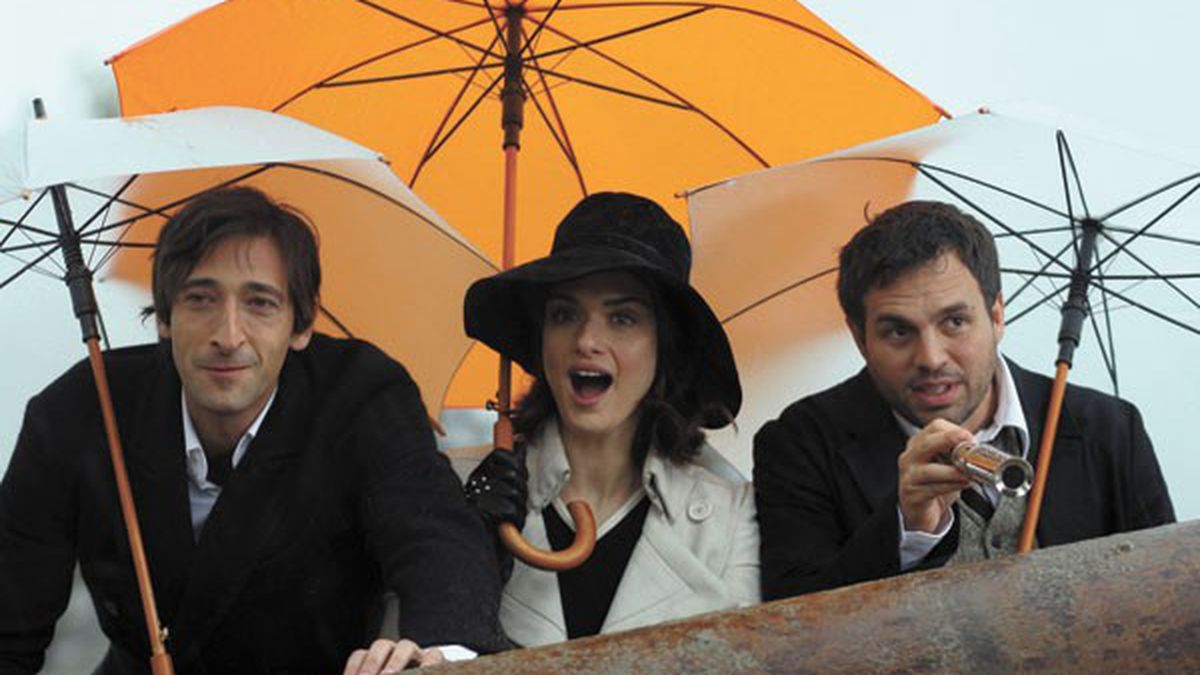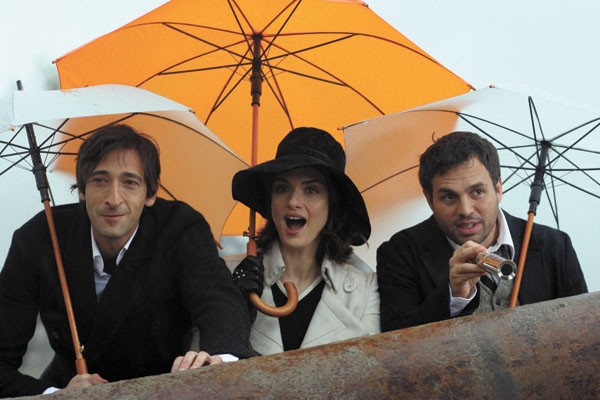The Brothers Bloom opens with a cute — almost too cute — montage sequence showing the childhood years of the two orphaned brothers as they run through a succession of unsuccessful foster-home situations. The two boys dress in Charlie Chaplin/Orthodox Jewish drag (black suits with black fedoras) and they’re fond of constructing elaborate hoaxes to bilk money from the other, luckier kids, the kids with families. Astute moviegoers will recognize the voice of the prologue narrator — it’s Ricky Jay, famed magician and trickster. And so it’s established that Bloom (Adrien Brody) and his brother Stephen (Mark Ruffalo) are born con men who take great delight in hustling the squares.
That all changes when they meet Penelope Stamp. Gullible heiress Penelope (played by Rachel Weisz) lives by herself in her exaggeratedly nutty New Jersey mansion, enjoys idly crashing her sports car into abutments, and otherwise seems the ideal subject for the brothers’ “last” confidence scheme, a bit of fluffle involving stolen gems in Europe. (Gangsters, cat burglars, and con men are forever embarking on “one last job” in movies, and it’s invariably the job in which they fall in love, get caught, or die. Or all three.) It is the work of but a few moments to gain Penelope’s trust.
Since Penelope is at loose ends, the suggestion to take an old-fashioned steamship, the SS Fidèle, across the Atlantic with Bloom, Stephen, and their cohort Bang Bang (Rinko Kikuchi) sounds like a merry diversion to her. She’s not even much alarmed when their little party is joined by the comically sinister “Curator,” Maximilian Melville (Robbie Coltrane), or when the expression on Bloom’s face begins to change from one of saturnine amusement to moon-calf lovey-dovey-ness. That change of mood more or less coincides with the switch from Nino Rota’s Amarcord music to Cat Stevens on writer-director Rian Johnson’s jukebox soundtrack. Who’s conning whom? And why?
Johnson impressed many, but not all, with Brick, his 2005 film-noir-goes-to-high-school. Its uneasy blend of mannerisms and emotion in the tale of a teenage drug dealer made for a natural intro to the more complicated, less laboriously arch observations of The Brothers Bloom. We can take Bloom‘s gorgeously wrought interiors and exteriors — shot on location in Romania, Montenegro, Serbia, and the Czech Republic — and file them all under Inconsequential Eye Candy. This film’s most important geography is on the faces of Brody, Ruffalo, and especially Weisz.
Early on, Bloom’s anguish takes the form of a soliloquy in which he longs for “an unwritten life.” That’s a strange request for such a transparently created character, but Brody captures our confidence, as well. The 36-year-old actor is blessed with the face of a much older man, and his most perceptive directors have taken advantage of that, from the Bronx mockney in Spike Lee’s Summer of Sam to the tormented artist in Polanski’s The Pianist. With his porkpie hat, angular features, and weary eyes, Bloom looks completely incapable of selling anything at all, let alone hot artworks. We’re quite convinced that he’d much rather hide out in a shack on the Adriatic than play silly games crawling through air ducts in Prague, no matter how much he stands to win.
Ruffalo’s Stephen, the brutal half, has his doubts as well, although they’re necessarily more physical. Johnson understands the essential frustration in Ruffalo’s screen presence (Zodiac, Reservation Road) and insists on playing it against the film’s most questionable line item, Bang Bang. Kikuchi’s troubled adolescence was the weakest of the plotlets in Babel, but at least the part had some gristle. Her nauseatingly cute, virtually dialogue-less explosives expert is a step backward for the 28-year-old Japanese actor, another of Bloom‘s bits of meaningless eye candy. Maybe she was hired to boost business in Asian markets?
Weisz, on the other hand, finally hits her stride in Bloom after years of warming up in chick flicks and Mummy tussles. Penelope’s sadness matches Bloom’s, and her “constipated soul” speech strikes a chord with him and with us. Penelope is more than just a mark, she’s a necessary ingredient in the life of any hustler, someone he can truly believe in. Besides which she’s rich and doesn’t mind taking a dare. The caper, the heist, the big score, the grand rip-off machinery of The Brothers Bloom take a back seat to the old-world soul restlessness of Bloom and Penelope, with Stephen and his little Bang Bang bringing up the rear. Even con men eventually grow up.
Con men grow up, and people die. That latter news flash is the rock-hard premise of filmmaker Yojiro Takita’s Departures, no doubt the best movie you’ll see this year about the Japanese traditional funeral business, and what it means for a man who’s searching, like Bloom, for something to believe in.
Evidently, economic hard times are continuing in Japan. Departures is the second film to play here this year, after Kiyoshi Kurosawa’s Tokyo Sonata, to follow the exploits of a laid-off Japanese urbanite. In this case, Daigo Kobayashi (played by actor Masahiro Motoki), a symphony orchestra cellist, joins the unemployed when his orchestra suddenly disbands. Daigo and his loyal wife Mika (Ryoko Hirosue) decide to relocate to Daigo’s old home town in Yamagata prefecture northeast of Tokyo, where they move into his late mother’s home: a funky wood-paneled lodge where she ran a small bar and cafe.
Daigo spots a local newspaper help-wanted ad for the “Departures” business. Assuming it’s a travel agency, he visits the office of Ikue Sasaki (Tsutomu Yamazaki) and his earthy assistant Yuriko (Kimiko Yo), only to discover that the sagely Sasaki-san is a practitioner of “encoffination,” the traditional ritual cleansing and preparing of a corpse for cremation, performed in the presence of the deceased’s family and close friends. It’s a profession with a social stigma attached, but Daigo needs work badly. He hesitantly accepts the job but decides to withhold the details from Mika, at least at first.
What follows — in addition to more Sunshine Cleaning-style chuckles on the subject of death and dying — is a warm, wise drama about how to live one’s life. Daigo learns to care for his uncomplaining clients with the “gentle affection” he eventually extends to his wife and friends, and takes up the cello again (having sold his concert instrument, he digs up the youth-sized cello he first learned on) with renewed understanding of the soothing effects of music. Director Takita, with help from composer Joe Hisaishi (he did the music for Hayao Miyazaki animated fantasies), gets moving performances from everyone, especially Motoki.
















